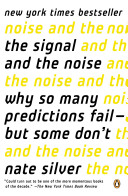Bayes and Richard Price on Predictions
Bayes’s much more famous work, “An Essay toward Solving a Problem in the Doctrine of Chances,”24 was not published until after his death, when it was brought to the Royal Society’s attention in 1763 by a friend of his named Richard Price. It concerned how we formulate probabilistic beliefs about the world when we encounter new data.
Price, in framing Bayes’s essay, gives the example of a person who emerges into the world (perhaps he is Adam, or perhaps he came from Plato’s cave) and sees the sun rise for the first time. At first, he does not know whether this is typical or some sort of freak occurrence. However, each day that he survives and the sun rises again, his confidence increases that it is a permanent feature of nature. Gradually, through this purely statistical form of inference, the probability he assigns to his prediction that the sun will rise again tomorrow approaches (although never exactly reaches) 100 percent.
Notes:
Giving the example of someone who watches the sun rise each day, increasing the probability that it will rise again the next day, but that probability never reaching 100 percent.
Folksonomies: statistics predictions
Taxonomies:
/science/mathematics/statistics (0.361427)
/business and industrial/energy/oil/oil and gas prices (0.285359)
/science/weather (0.283455)
Keywords:
sun rise (0.988505 (neutral:0.000000)), Richard Price (0.947904 (neutral:0.000000)), purely statistical form (0.855262 (neutral:0.000000)), Bayes (0.665486 (positive:0.115980)), probabilistic beliefs (0.609052 (negative:-0.666283)), famous work (0.605753 (negative:-0.293234)), Royal Society (0.597808 (neutral:0.000000)), freak occurrence (0.591577 (negative:-0.419785)), new data (0.583742 (negative:-0.666283)), permanent feature (0.542520 (positive:0.638927)), probability (0.509410 (negative:-0.425597)), percent (0.381812 (negative:-0.524539)), example (0.341711 (positive:0.568488)), world (0.285312 (negative:-0.097795)), Chances (0.226787 (negative:-0.285440)), Predictions (0.213958 (neutral:0.000000)), inference (0.208521 (neutral:0.000000)), Plato (0.207391 (neutral:0.000000)), sort (0.205941 (negative:-0.419785)), friend (0.202586 (neutral:0.000000)), Solving (0.202389 (negative:-0.285440)), attention (0.202367 (neutral:0.000000)), Doctrine (0.200738 (negative:-0.285440))
Entities:
Bayes:Person (0.843068 (positive:0.057990)), Richard Price:Person (0.800213 (neutral:0.000000)), Adam:Person (0.474102 (positive:0.089557)), Royal Society:Organization (0.323190 (neutral:0.000000)), 100 percent:Quantity (0.323190 (neutral:0.000000))
Concepts:
Probability theory (0.911602): dbpedia | freebase | opencyc
Sun (0.900461): dbpedia | freebase | opencyc
Sunrise (0.883842): dbpedia | freebase | opencyc
Probability (0.813595): dbpedia | freebase
Statistics (0.769342): dbpedia | freebase | opencyc
Bayesian probability (0.648641): dbpedia | freebase
Earth (0.635809): dbpedia | freebase
Equator (0.628270): dbpedia | freebase





